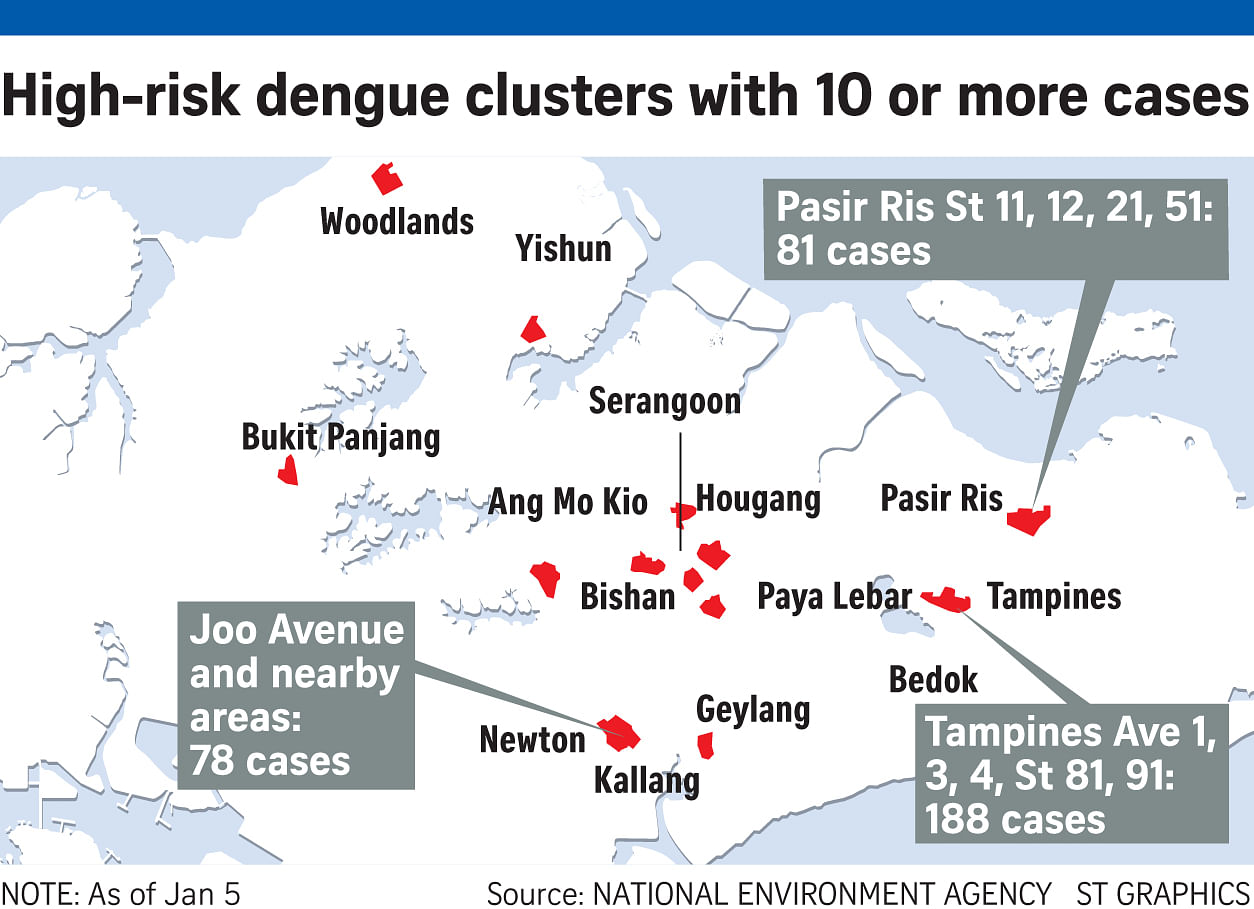Residents take action in worst dengue clusters
Worried about the risk of infection, they resort to pouring soapy water into toilet bowls and keeping windows closed
Sign up now: Get ST's newsletters delivered to your inbox
Sheryl Lee, Chitra Kumar
Follow topic:
Some households keep all their windows shut day and night. Others have taken to pouring soapy water into their toilet bowls, or wearing mosquito repellent patches 24/7.
But these residents living in some of Singapore's worst dengue hot spots all share a constant worry about the risk of infection.
Mr Segar Gopal, a 47-year-old who runs his own business and lives in a terraced house in Sing Avenue, a stone's throw away from Little India, said his sister and nephew were diagnosed with dengue last November.
That was when the pair were staying with him while waiting for the keys to their new house.
Now, he is concerned for his 83-year-old father.
"My dad is old and I am afraid he won't be able to cope if he catches dengue, especially since he has been very sick lately," said Mr Segar, whose family has stopped keeping vases of flowers in the home to help prevent the breeding of mosquitoes.

The private housing estate he lives in accounts for 22 dengue cases out of the 78 in the cluster that includes Joo Avenue and Race Course Road, making it the third largest current hot spot as of Tuesday.
Dengue cases rose sharply at the end of last year.
The week of Dec 27 to Jan 2 saw 455 cases - the highest for the year and 86 more than in the previous week. It brings the total number of people infected last year to more than 11,000, with four dying from this mosquito-borne viral disease.
The victims are mainly from the eastern half of the country, with the largest of the 110 active clusters in Tampines, which has seen 188 cases as of Tuesday.
The National Environment Agency (NEA) warned that it has been seeing a rise in the number of Aedes mosquitoes - the ones that transmit the dengue virus - likely caused by the warmer year-end weather, leading to mosquitoes breeding and maturing faster.
Living at Block 933 in Tampines Street 91 puts Mr Lee and his family in one of the worst-affected blocks. Block 933 has already seen 11 cases as of Tuesday, and Mr Lee, who declined to give his full name, is one of them. He told The Straits Times yesterday that he had only recently been discharged from hospital.
"I have lived here for the past 20 years and I have never had a dengue problem until recently," he said, airing his belief that the construction work on the Downtown Line MRT going on directly below his block might have contributed to it.
Similar concerns were shared by his neighbours, who added that they were doing their part in keeping their homes free of standing water. Most cases of mosquito breeding are found in homes, in containers, flower pot plates and trays.
The residents highlighted how the NEA has sent them letters and made repeated visits to raise awareness on dengue and how to prevent it. They added that they have seen NEA notices telling them that their corridors were being sprayed with pesticide.
"The NEA does regular checks to make sure we are carrying out proper preventive measures," said Ms Siti Syazalina, 23, a recent National University of Singapore graduate who also lives in Block 933 with her family. "For example, (NEA officers) check under our sinks to make sure water doesn't collect there from leakages."
She caught dengue last August.
"I couldn't do anything and missed two weeks of school," she said, adding that she also had to go down to a polyclinic every day to get her blood count checked.
Ms Kalpana Goda, a 49-year-old housewife who lives in Block 932, said she keeps all the windows closed to prevent mosquitoes from flying in.
"It is stifling, but I have no choice," she said .
A resident in Sing Avenue, engineer Pang M.P., 50, who contracted dengue last November, said he is not sure how and where he was infected despite being careful.
Now, to be extra careful, he pours a layer of soap solution into the toilet bowls. "This is to prevent the mosquitoes from laying eggs."

